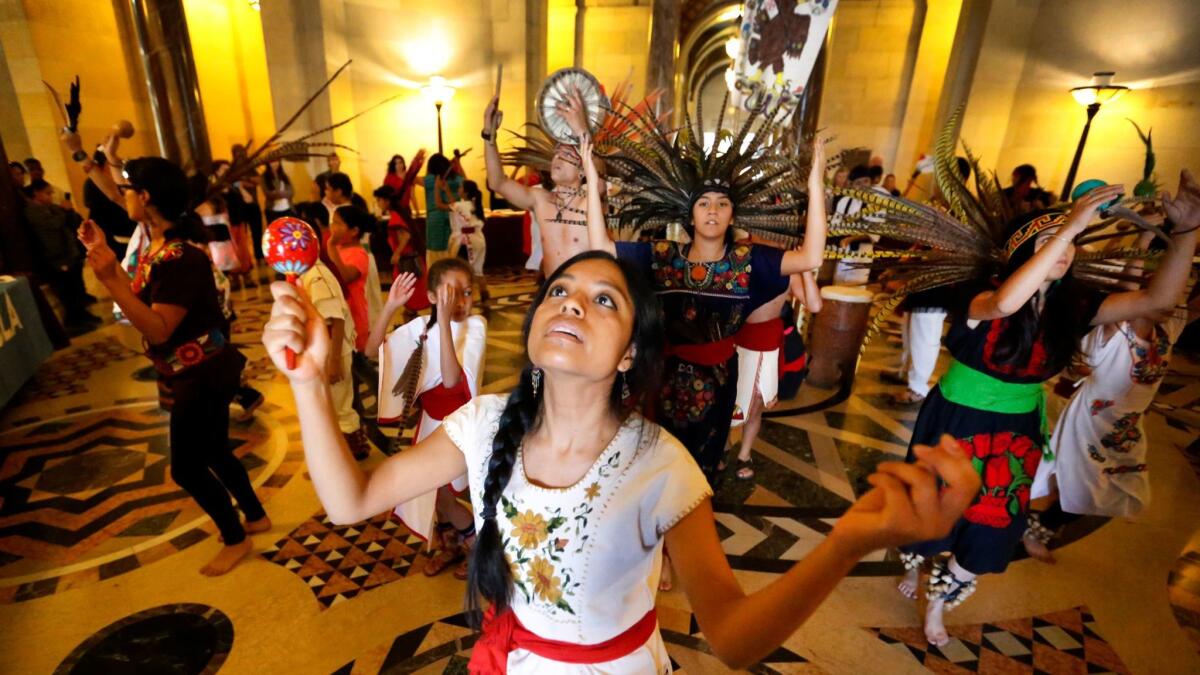California Journal: Replacing Columbus Day with Indigenous Peoples Day is a long overdue victory for civil rights

- Share via
Twenty five years ago, ahead of its time as usual, the city of Berkeley renamed Columbus Day as Indigenous Peoples Day.
Los Angeles, what took you so long?
This week, despite heartfelt pleas by some Italian-Americans to preserve the annual commemoration of Christopher Columbus, who was born in Genoa, the council did what can only be described as the right thing: It copied Berkeley.
Henceforth in Los Angeles, there will be no day devoted solely to the achievements of Columbus, who was both the discoverer of the New World and the catalyst for the destruction of Native American people and their cultures in the centuries that followed.
Instead, as my colleague David Zahniser has reported, the city will celebrate Indigenous Peoples Day on the second Monday of October (coinciding with the federal Columbus Day holiday).
Councilman Mitch O’Farrell, a member of the Wyandotte Nation, pushed for the change, while Councilman Joe Buscaino, who promotes his Italian heritage with gusto, pushed back. Buscaino had suggested replacing Columbus Day with “Diversity Day,” but the suggestion went nowhere.
Italian-Americans who are worried about symbolic erasure need not fret. The council also voted to designate each Oct. 12 as Italian Heritage Day. It was on that day in 1492 that Columbus arrived in the Bahamas, mistakenly believing he’d reached Asia. In his log, Columbus described the native Arawak population: “They would make fine servants. . . . With fifty men we could subjugate them all and make them do whatever we want.”
::
Over the last few months, Americans have been having a very public, very loud conversation about the way we commemorate our country’s checkered history. Should statues of people once considered heroes and now considered goats be knocked from their pedestals? Should their names be allowed to grace our libraries, schools and courthouses?
Let the people decide, or the courts if they can’t.
History is written by victors, and promulgated by their descendants. But the narrative, as we see in the case of Columbus Day and Confederate statues, is always shifting. Rather than thinking of this as an erasure of history, think of it as a correction.
Columbus Day didn’t even become a national holiday until 1937, a good 4 1/2 centuries after his first voyage to the New World. President Franklin Roosevelt signed the order after intense lobbying by the Knights of Columbus, the Catholic fraternal order. This was a victory for Catholics, whose persecution in this country should not be underestimated. Anti-Catholicism was once described by the historian Arthur M. Schlesinger as “the deepest bias in the history of the American people.”
Statues of Confederate “heroes” didn’t begin sprouting up around the South and elsewhere until long after the Civil War was over, and a lingering bitterness found expression.
In an April essay in the Atlantic, New Orleans Mayor Mitch Landrieu explained why his city recently took down monuments to Robert E. Lee, Jefferson Davis and P.G.T. Beauregard.
The statues, he wrote, “were erected not just to honor these men, but as part of the movement which became known as the The Cult of the Lost Cause. This ‘cult’ had one goal … to rewrite history to hide the truth….These monuments purposefully celebrate a fictional, sanitized Confederacy; ignoring the death, ignoring the enslavement, and the terror it actually stood for.”
The same could be said about Columbus Day.
For a bracing counter-narrative to the whitewashed American history curriculum, I recommend Howard Zinn’s landmark 1980 bestseller, “A People’s History of the United States.”
“When we read the history books given to children in the United States,” wrote Zinn, who died in 2010, “it all starts with heroic adventure — there is no bloodshed — and Columbus Day is a celebration…. To emphasize the heroism of Columbus and his successors as navigators and discoverers, and to deemphasize their genocide, is not a technical necessity but an ideological choice. It serves, unwittingly, to justify what was done.”
::
Last weekend, I spent some time with friends. In time, talk turned to the white supremacist-driven violence in Charlottesville, and the ostensible reason for the protest: the removal of a statute of Confederate Gen. Robert E. Lee from a local park.
There seemed to be a consensus that statues of men (they are always men) who represent the cause of white supremacy are an affront to people of good will, particularly African Americans, whose economic and political circumstances are to this day a reflection of American government policies purposely designed to keep them at a disadvantage.
And yet, no one could really build a head of steam about the issue.
Personally, I don’t feel I have enough emotional bandwidth to get worked up about a statue of Lee when we have a bellicose president who is systematically turning back the clock on progress made by all sorts of Americans — blacks, Latinos, women, gays, transgender — and when we have a major American city underwater partly because its elected officials have never seen the point of zoning laws or of planning for global climate change.
Erasing Columbus Day has never been at the top of my priority list, but I’m glad the L.A. City Council has taken action. Thanks to Berkeley, I’ve already been celebrating Indigenous Peoples Day for years.
Now Angelenos can, too.
Twitter: @AbcarianLAT
Some good news for a family whose jailed father is facing deportation to Guatemala
A crude display of wealth and economic condescension in Trump’s America? But of course
President finally speaks from the heart. Former KKK leader says, ‘Thank you’
More to Read
Sign up for Essential California
The most important California stories and recommendations in your inbox every morning.
You may occasionally receive promotional content from the Los Angeles Times.











